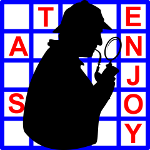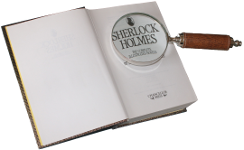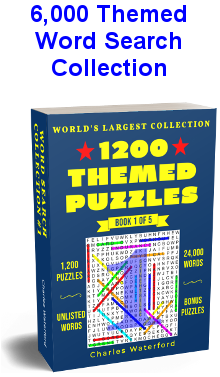Grid Search

| No. of Players: | 2 |
| Type of Game: | written |
| What you need: | pen and paper |
Goal
To find a word your opponent has hidden in a grid.
How to play
Before this game begins, both players first draw a five-by-five grid. They label the rows A through E and the columns 1 through 5. In this way each square in the grid can be identified by a letter-number combination. For instance, the top right-hand corner square is A5 and the center square is C3. Each player then writes a five-letter word down one of the columns, or across one of the rows. They then fill the remaining 20 squares with random letters, being careful not to form any additional five-letter words. On the same sheet of paper, each player also draws another five-by-five grid whose rows and columns are similarly labeled with letters and numbers. But players do not write any letters in this second grid until the game begins.
To begin the game, one player calls out a letter-number and the second player reports what letter he has in that square. The first player then writes down that letter in his blank grid. The second player calls out a letter-number and similarly marks down the letter of his opponent. This process continues until enough letters accumulate so that players want to guess at their opponent's five-letter word instead of calling out a letter-number. If they guess correctly, they win the round and score points for every blank square left in their opponent's grid. But if the guess is incorrect, the game continues until someone does win with a correct guess. The ultimate winner is the player who accumulates the most points after a set number of rounds has been played. For additional difficulty, players can agree that hidden words can run backward along a row and up a column.
Other versions of this game include:
| Phrase Maze | – | a game that hides a phrase instead of a word; and |
| Word Battleship | – | a game that hides multiple words in a larger grid |
Example
Alonzo prepares his grid with his chosen word HOUSE running down the second column. After a few turns, his completed grid and partially-filled grid looks like this:
Alonzo strategically begins a few of the rows and columns with letters that could begin actual words, like STAR_, SHAR_ and RISK_. In this way, his opponent Bret might waste time focusing on areas of the grid that do not contain the hidden word.
Since Alonzo and Bret agreed that only left-to-right and up-to-down words are permitted, he initially focuses on discovering letters near the top row and near the leftmost column. Already he can see there are possible words like TREND or TASTE, but it is still too early in the round to make a guess.
Did you know?
If you ask most people to name their favorite detective, they invariably say Sherlock Holmes. And if you further ask them to name the first thing that comes to mind with this fictional character, they usually give you a half-serious look and say "Elementary, my dear Watson."

But while this famous phrase is universally attributed to Sherlock Holmes, it actually doesn't appear in any of Sir Arthur Conan Doyle's 60 stories. The closest Holmes comes to uttering these exact words is:
- "Elementary" in "The Adventure of the Crooked Man"
- "It was very superficial my dear Watson" in "The Adventure of the Cardboard Box"
- "Exactly, my dear Watson" in three other stories

